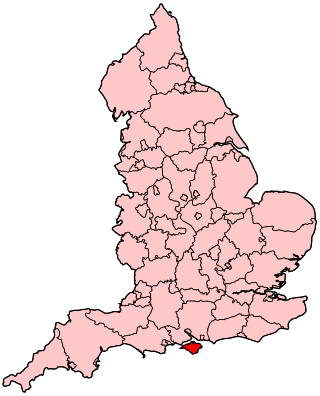Lancashire Teaching Hospitals NHS Foundation Trust is one of the United Kingdom's NHS Foundation Trusts. It provides healthcare for people in the Preston area and surrounding area in northwest England. The trust runs Royal Preston Hospital on the northern outskirts of the city in the Fulwood area and Chorley and South Ribble Hospital.

The South East Coast Ambulance Service NHS Foundation Trust (SECAmb) is the NHS ambulance services trust for south-eastern England, covering Kent, Surrey, West Sussex and East Sussex. It also covers a part of north-eastern Hampshire around Aldershot, Farnborough, Fleet and Yateley. The service was made an NHS foundation trust on 1 March 2011.

The Queen Alexandra Hospital is a large NHS hospital in Portsmouth, Hampshire. Located in Cosham, it is run by Portsmouth Hospitals University NHS Trust and has a Ministry of Defence Hospital Unit attached.

The South Western Ambulance Service NHS Foundation Trust (SWASFT) is the organisation responsible for providing ambulance services for the National Health Service (NHS) across South West England. It serves the council areas of Bath and North East Somerset, Bournemouth, Christchurch and Poole Council, Bristol, Cornwall, Devon, Dorset, Gloucestershire, North Somerset, Plymouth, Isles of Scilly, Somerset, South Gloucestershire, Swindon, Torbay and Wiltshire.

The South Central Ambulance Service NHS Foundation Trust (SCAS) is the ambulance service for the counties of Berkshire, Buckinghamshire, Oxfordshire and most of Hampshire. It is a foundation trust of the National Health Service, and one of ten NHS ambulance trusts in England. As of August 2022, SCAS is currently rated Inadequate by the CQC following multiple failings within the trust. SCAS is the only Ambulance Service in England to have received this rating.

Emergency medical services in the United Kingdom provide emergency care to people with acute illness or injury and are predominantly provided free at the point of use by the four National Health Services (NHS) of England, Scotland, Wales, and Northern Ireland. Emergency care including ambulance and emergency department treatment is only free to UK residents and a charge may be made to those not entitled to free NHS care.
The Princess Alexandra Hospital NHS Trust serves a population of 258,000 and provides healthcare services to the communities of Harlow and the surrounding areas. It runs Princess Alexandra Hospital in Harlow, Essex, England which is a 419 bedded District General Hospital providing acute and specialist services to a local population of 258,000 people. It has been led since May 2017 by Lance McCarthy and Steve Clarke (chairman). It has a hospital radio station, Harlow Hospital Radio.
NHS targets are performance measures used by NHS England, NHS Scotland, NHS Wales, and the Health and Social Care service in Northern Ireland. These vary by country but assess the performance of each health service against measures such as 5 hour waiting times in Accident and Emergency departments, weeks to receive an appointment and/or treatment, and performance in specific departments such as oncology.
Colchester Hospital University NHS Foundation Trust (CHUFT) was an NHS Foundation Trust which ran Colchester Hospital in Colchester, Essex.

The East Midlands Ambulance Service NHS Trust (EMAS) provides emergency medical services, urgent care and patient transport services for the 4.8 million people within the East Midlands region of the UK - covering Nottinghamshire, Derbyshire, Leicestershire, Rutland, Lincolnshire and Northamptonshire. It was formed in 1999 by amalgamating several county ambulance services, and in July 2006 was dissolved and reformed under the same name as part of a nationwide reorganisation of ambulance service provision.
Medway NHS Trust is an NHS foundation trust based in Kent which runs Medway Maritime Hospital.

Hinchingbrooke Hospital is a small district general hospital in Hinchingbrooke near Huntingdon, Cambridgeshire. Opened in 1983, it serves the Huntingdonshire area, and has a range of specialities as well as an emergency department and a maternity unit. The hospital is managed by the North West Anglia NHS Foundation Trust.
The Hillingdon Hospitals NHS Foundation Trust is the NHS trust responsible for the healthcare services provided at Hillingdon Hospital and Mount Vernon Hospital in the London Borough of Hillingdon.
United Lincolnshire Hospitals NHS Trust is an NHS trust which runs County Hospital Louth, Lincoln County Hospital, Pilgrim Hospital in Boston, Skegness and District Hospital, and Grantham and District Hospital.
Blackpool Teaching Hospitals NHS Foundation Trust is an NHS Foundation Trust providing health services in North Lancashire, England. It runs Blackpool Victoria Hospital which is a large busy acute hospital; two smaller community hospitals - Clifton Hospital and Fleetwood Hospital; the National Artificial Eye Service; Blenheim House Child Development Centre and community health services for North Lancashire.

The Isle of Wight NHS Trust is an NHS trust which provides physical health, mental health and ambulance services for the Isle of Wight. The trust is unique in being the only integrated acute, community, mental health and ambulance health care provider in England. It runs St Mary's Hospital and the Isle of Wight Ambulance Service.

Worcestershire Acute Hospitals NHS Trust is an NHS trust which runs three hospitals and one ward in Worcestershire, England: The Worcestershire Royal Hospital in Worcester, the Alexandra Hospital in Redditch, Kidderminster Hospital and Treatment Centre in Kidderminster, and Burlingham Ward at Evesham Community Hospital in Evesham.
London North West University Healthcare NHS Trust is an NHS trust based in London, United Kingdom. The trust was formed by the merger of North West London Hospitals NHS Trust and Ealing Hospital NHS Trusts in October 2014.
Healthcare in Cornwall was until July 2022 the responsibility of Kernow clinical commissioning group, a National Health Service (NHS) organisation set up by the Health and Social Care Act 2012 to organise the delivery of NHS services in England. As far as the NHS is concerned, Cornwall includes the Isles of Scilly.
Healthcare in Hampshire was the responsibility of six clinical commissioning groups until July 2022. These were based in Southampton, Portsmouth, North East Hampshire and Farnham, South Eastern Hampshire, West Hampshire, and North Hampshire. In 2018, the Hampshire and Isle of Wight Partnership of Clinical Commissioning Groups was set up. Maggie MacIsaac was Chief Executive.









